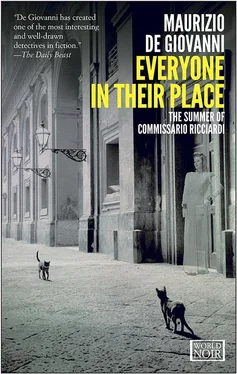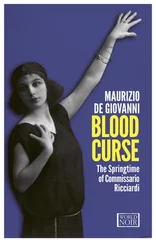Maurizio de Giovanni - Everyone in Their Place
Здесь есть возможность читать онлайн «Maurizio de Giovanni - Everyone in Their Place» весь текст электронной книги совершенно бесплатно (целиком полную версию без сокращений). В некоторых случаях можно слушать аудио, скачать через торрент в формате fb2 и присутствует краткое содержание. Жанр: Исторический детектив, Полицейский детектив, на английском языке. Описание произведения, (предисловие) а так же отзывы посетителей доступны на портале библиотеки ЛибКат.
- Название:Everyone in Their Place
- Автор:
- Жанр:
- Год:неизвестен
- ISBN:нет данных
- Рейтинг книги:4 / 5. Голосов: 1
-
Избранное:Добавить в избранное
- Отзывы:
-
Ваша оценка:
- 80
- 1
- 2
- 3
- 4
- 5
Everyone in Their Place: краткое содержание, описание и аннотация
Предлагаем к чтению аннотацию, описание, краткое содержание или предисловие (зависит от того, что написал сам автор книги «Everyone in Their Place»). Если вы не нашли необходимую информацию о книге — напишите в комментариях, мы постараемся отыскать её.
Everyone in Their Place — читать онлайн бесплатно полную книгу (весь текст) целиком
Ниже представлен текст книги, разбитый по страницам. Система сохранения места последней прочитанной страницы, позволяет с удобством читать онлайн бесплатно книгу «Everyone in Their Place», без необходимости каждый раз заново искать на чём Вы остановились. Поставьте закладку, и сможете в любой момент перейти на страницу, на которой закончили чтение.
Интервал:
Закладка:
She underlined those words with a brief caress of the scarred side of her face, which was turned to the shadows. The other profile, faintly illuminated by the streetlamp, was as Maione remembered it: heartbreakingly beautiful.
“Don’t think twice, Filomena; after all, it’s my duty to help people. And with you it was a pleasure, as you know. In fact, I only wish I could’ve done more. Your son Gaetano, how’s he doing?”
“Fine, thanks. He’s no longer an apprentice, the master mason has hired him, he says he’s good at what he does. He took the place of Rituccia’s father, do you remember her? That little girl who lived nearby, now she lives with us.”
Maione remembered her perfectly: a serious little girl, with a sorrowful, unsettling look in her eyes. One of those encounters that punctuated the events in which he had been embroiled a few months earlier; when, one fine spring morning, he found himself stanching the bloody wound that had forever altered that woman’s face. In a single dizzying instant, the brigadier relived the new and profound emotions that spending time with Filomena had stirred in him.
“Would you care to stay for dinner? I could make you something cool, maybe macaroni with tomato and basil. As I recall, you liked that dish, or am I mistaken?”
Maione could hear his stomach rumble, like distant thunder.
“No, thanks, Filome’, I’m having some digestive problems; I’m going to just skip dinner, tonight.”
In the partial darkness, the woman stepped closer, scrutinizing his face.
“Are you all right, Raffae’? You strike me as pale, hollowed out. And you’ve lost weight. Don’t you worry me now, you know that I care about you.”
Maione couldn’t have hoped for a more flattering compliment. He’d lost weight. As if someone had told him he’d grown wings and a halo.
“Don’t be ridiculous, no, no, it’s just that I’ve had a long day, a very long day. Maybe I’m just a little tired.”
Filomena was eyeing him with concern, her head tilted over on her shoulder. She was beautiful. Without warning, she reached out her hand and caressed Maione’s face. The hand felt light and cool as a breeze to him. He barely touched the visor of his cap, then turned and fled, feeling like a coward the way he did every time he saw her.
Rosa Vaglio was one of those women of bygone times who expressed her love by making food. And since she’d been born dirt poor, the greater the love, she thought, the more the food, condiments added. And since she loved Luigi Alfredo Ricciardi more than anything else on earth, she cooked for him a succession of terrible dishes that would have easily killed a full grown bull, if that bull had ventured to eat her eggplant parmigiana.
The first time she had seen him, he was covered with blood, cradled in the midwife’s hands, with his beautiful green eyes still shut. She’d held him in her arms even before his poor mamma, the sweet Baroness Marta, who had died so many years ago. And she had watched him at play a thousand times, while she knit or washed clothing with one eye out to make sure he was in no danger, silent and reckless as he always was.
She had sat up, watching over his restless sleep, wondering what terrible things he might be dreaming when she saw him jerk and murmur in his sleep. She’d kissed his forehead a thousand times, trying to detect the slightest warmth of fever that she was infallibly able to discern. When his mother died, and even before that, she had become the inflexible administrator of the family’s substantial assets, which Ricciardi ignored entirely; it was she who maintained the correspondence, in her unlovely, oversized handwriting, with the overseers and sharecroppers: she never overlooked a cent, and she set everything by so that it would be fully accounted for when Luigi Alfredo finally woke up from his obsession with being a policeman and made up his mind to take his rightful place as the Baron of Malomonte, and started a family of his own.
This matter of the family was Tata Rosa’s one great obsession and regret. Her simple mind had few bedrock certainties, and one of those was that without children, no life could be considered complete. She had devoted her own life to Ricciardi, and he had repaid her with more worries and concerns than ten children could have given her, with his stubborn solitude; what she could not accept was the idea that he was willing to let his family’s name die out. All too often, even though she was aware that she was becoming obsessive and intrusive, she had tried to push him to socialize more, to get to know girls, and all she got in return was a shrug and a pat on the cheek. She’d even wondered whether her boy was one of those who just didn’t like girls: but her heart told her that that wasn’t the case, his only problem was that he was not yet ready. He was waiting for the right moment.
And now, after all these years, as Rosa set a mound of baked macaroni, spiced up with every condiment imaginable, before him, she finally thought that the time had come. She had noticed some time ago that, when he looked out his bedroom window at the young woman who lived across the way, Ricciardi had begun to wave a hasty greeting with one hand. Of course, he had no idea that she could look through a crack in his doorjamb to see what was happening in his bedroom; for that matter, how else could she be sure that he was all right, when he shut himself in at night?
And the girl, she had seen from her own window, responded with a slight nod of her head. The ice was beginning to melt. As far as that went, in this heat wave the ice had never really had a chance, thought Rosa. And she smiled.
As usual, Ricciardi had first begun to smell the odor of Rosa’s cooking from at least two hundred yards away. He was well aware that he had a highly developed sense of smell, but still he wondered how it could be that the entire neighborhood failed to rise in open mutiny against the toxic fumes that filled the air, fumes that clearly originated in his tata ’s kitchen. Still, he had to admit that the smells that came from his apartment were no worse than the varieties of rot that wafted out of the surrounding vicoli . In other words, there was just no getting away from it.
Along the way home from his meeting with Modo, he had continued to mull over what the doctor had told him. There was no mistaking the fact that the duchess knew her murderer: the padlock hadn’t been forced, the keys were in their place in the drawer, nothing had been broken among the countless items in the anteroom. Still, there had been a struggle, and it was demonstrated by the marks on the victim’s body; as well as the cushion pressed down on her face, forcefully, clearly to make sure that the duchess was unable to scream. Perhaps Maione was right: before heading home, he had said that in his opinion it was the murderer himself who had arranged the dead body, out of respect, out of love.
Out of love. How many strange, absurd things he had seen people do out of love. And how treacherous, he thought as he ate under Rosa’s vigilant gaze, this sentiment could be as it made its way into the folds of one’s thoughts, infecting one’s soul. He had struggled and continued to struggle, but he couldn’t seem to keep himself from thinking with growing anxiety about his innocent nightly appointment, and the slight wave of greeting that he exchanged with his across-the-street neighbor. He couldn’t have said whether it was worse or better than before, as he watched her embroider from hiding, just to drink in her normality, like some healthful herbal tea.
He knew nothing about love. But if he were ever to talk about it, he would’ve said that it was important to protect the object of one’s affections from evil, even if the evil happens to be in the person in love. Especially if the evil happens to be in the person in love. And so in his case, if love was what he felt for Enrica, then it was incumbent upon him to keep her safely distant from his curse, from the savage and terrible pain that he carried within him.
Читать дальшеИнтервал:
Закладка:
Похожие книги на «Everyone in Their Place»
Представляем Вашему вниманию похожие книги на «Everyone in Their Place» списком для выбора. Мы отобрали схожую по названию и смыслу литературу в надежде предоставить читателям больше вариантов отыскать новые, интересные, ещё непрочитанные произведения.
Обсуждение, отзывы о книге «Everyone in Their Place» и просто собственные мнения читателей. Оставьте ваши комментарии, напишите, что Вы думаете о произведении, его смысле или главных героях. Укажите что конкретно понравилось, а что нет, и почему Вы так считаете.












